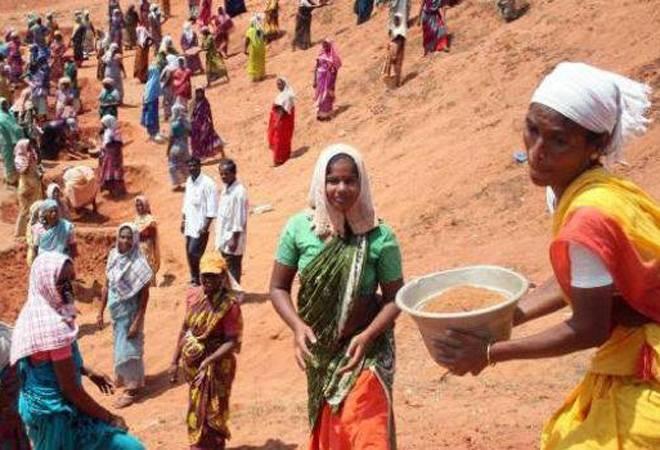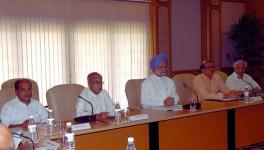Use of App to Record MGNREGA Attendance ‘Violation’ of Worker Rights, Act

Image Courtesy: Business Today
The Peoples’ Action for Employment Guarantee (PAEG) has opposed the rural development ministry’s May 13 order discontinuing manual attendance at Mahatma Gandhi National Rural Employment Guarantee Act (MGNREGA) scheme worksites with more than 20 workers and replacing it with the National Mobile Monitoring System (NMMS) app.
Terming the decision as a violation of law that will be regressive to the gains made in efforts to strengthen worksite transparency and exclude women, the PAEG—a group of academicians and activists attempting to ensure better implementation of NREGA via research, advocacy and public intervention—said that the move is fraught with technical challenges.
PAEG joint secretary Vijay Ram S said that the organisation is “disturbed that, instead of ensuring time-bound action on social audit findings (as is evidenced by the fact that action has not been taken in most of the cases arising from social audits conducted in the last financial year), the ministry is resorting to the use of ‘apps’ in the name of “increasing citizen oversight”.
In a letter addressed to the ministry’s secretary NN Sinha, the PAEG wrote that the “non-provision of physical muster rolls at NREGA worksites, which record work completed per day in addition to the daily attendance, is a direct violation of the Act”.
According to Section 15, Schedule I of the Act, Muster rolls shall be maintained at the worksite by marking attendance daily by a person authorised under the Scheme, the letter states.
Other signatories of the letter include Jayati Ghosh, professor and member, UN Advisory Board on Multiculturalism; Amit Basole, associate professor and head, Centre for Sustainable Employment, Azim Premji University; Aruna Roy and Nikhil Dey, founder, Mazdoor Kisan Shakti Sagathan; Annie Raja, general secretary, National Federation of Indian Women; agricultural activist Nachiket Udupa; Anindita Adhikari and Rakshita Swamy, lead, Social Accountability Forum for Action and Research; and Rajendran Narayanan, founder, LibTech India.
Under Section 15, Schedule I, the letter states, when work is in progress, the workers engaged in that work may select from amongst themselves not less than five workers on a weekly rotational basis to verify and certify all the bills or vouchers of their worksite, at least, once in a week. Any person shall have access to muster rolls on the worksite on demand all days during all working hours.
Section 22, Schedule II, states: “For the purpose of transparency at the worksite, the measurement record of each work must be ensured and details of the workers shall be available for public inspection.”
The NMMS app specifies that it is mandatory for workers to upload two time-stamped photos within a predetermined time window designed by the app. “This is in direct contravention of Section 3 of the Act, which clearly states that workers are entitled to wages under MGNREGA on the basis of work completed by them, i.e., on a piece-rate basis. By forcing the workers to stay for a specified number of hours irrespective of when they finish work, the app is forcing a time-rate basis for payment of wages,” the letter stated.
Contending that there is no way a mate can check if the attendance entered by him/her is correct, the PAEG wrote that they can make the entries “again and again” but won’t get to see what has finally been uploaded because of which they cannot show it to the workers.
The order “fundamentally undermines” the ministry’s own repeated push towards encouraging women workers from rural areas to be trained and appointed as MNREGA workers. Terming order as a “massive deterrent” to women empowerment, the PAEG wrote: “Having a smartphone is now mandatory for mates to record attendance on the NMMS. However, as you may appreciate, many women from poorer households—a large fraction of whom belong to SC/ST communities—do not have access to smartphones. Even among families that have smartphones, it is an accepted reality that women are the last ones to access them as per priority.”
Besides, the app is designed in English. All messages, errors, and instructions are available only in English making it even more “inaccessible” to rural women workers.
“Given that the NMMS has already faced outages for almost 10 days in May, it is hardly reliable.” Workers at MNREGA sites cannot register their attendance and are asked to return home due to the server’s fault, which is a violation of their rights, the signatories said. “In Dungarpur, for example, an instance was reported where workers worked on a MGNREGA site for 13 days but the attendance recorded on the NMMS app was only 5 days. Since the workers concerned were a part of a union, they alerted authorities of the discrepancy before the concerned FTO was processed, and the issue was rectified after hectic petitioning to the collector and CEO.”
Besides, the errors listed on the app when there is a technical failure are in an “incomprehensible language that a common person, let alone a MNREGA worker and mate, cannot comprehend”. For example, one of the frequent errors that appear on the app states: “java.net.SocketTimeoutException: timeout”. “These errors don’t even make sense to people who understand English.”
Since the app is linked to a SIM card, the mate cannot log in from a different phone with his/her mate ID. “This means that for some reason if the mate is facing issues with his/her phone such as the phone being spoilt or out of charge, etc., the mate cannot register attendance on the day.”
Therefore, we are disturbed that, instead of ensuring time-bound action on social audit findings (as is evidenced by the fact that action has not been taken in most of the cases arising from social audits conducted in the last financial year) the Ministry is resorting to the use of ‘apps’ in the name of “increasing citizen oversight”.
“Moreover, the MNREGA MIS remains inaccessible to MGNREGA workers and collectives on a 24/7 basis as evidenced by frequent cases when the MIS reports are not viewable on account of server errors. Owing to repeated technical glitches in various aspects of MGNREGA implementation, we are apprehensive that disproportionate national resources would go into fixing technical bugs at the cost of workers’ rights,” the letter states.
In the light of the concerns mentioned in the letter, the PAEG requested the ministry to “immediately withdraw the usage of the NMMS app. “This is needed in order to be in legal compliance with the provisions of the Act.”
Get the latest reports & analysis with people's perspective on Protests, movements & deep analytical videos, discussions of the current affairs in your Telegram app. Subscribe to NewsClick's Telegram channel & get Real-Time updates on stories, as they get published on our website.























